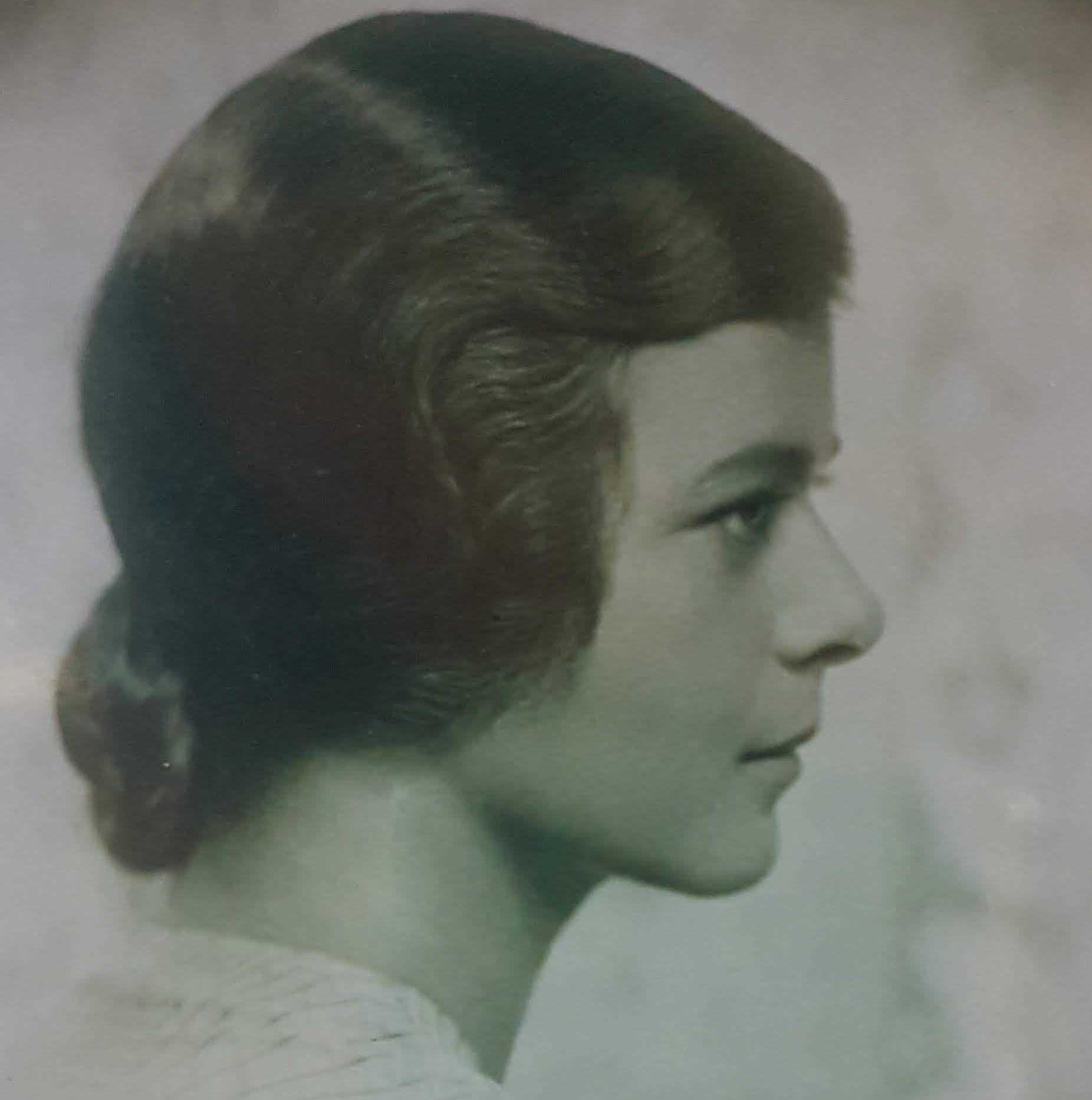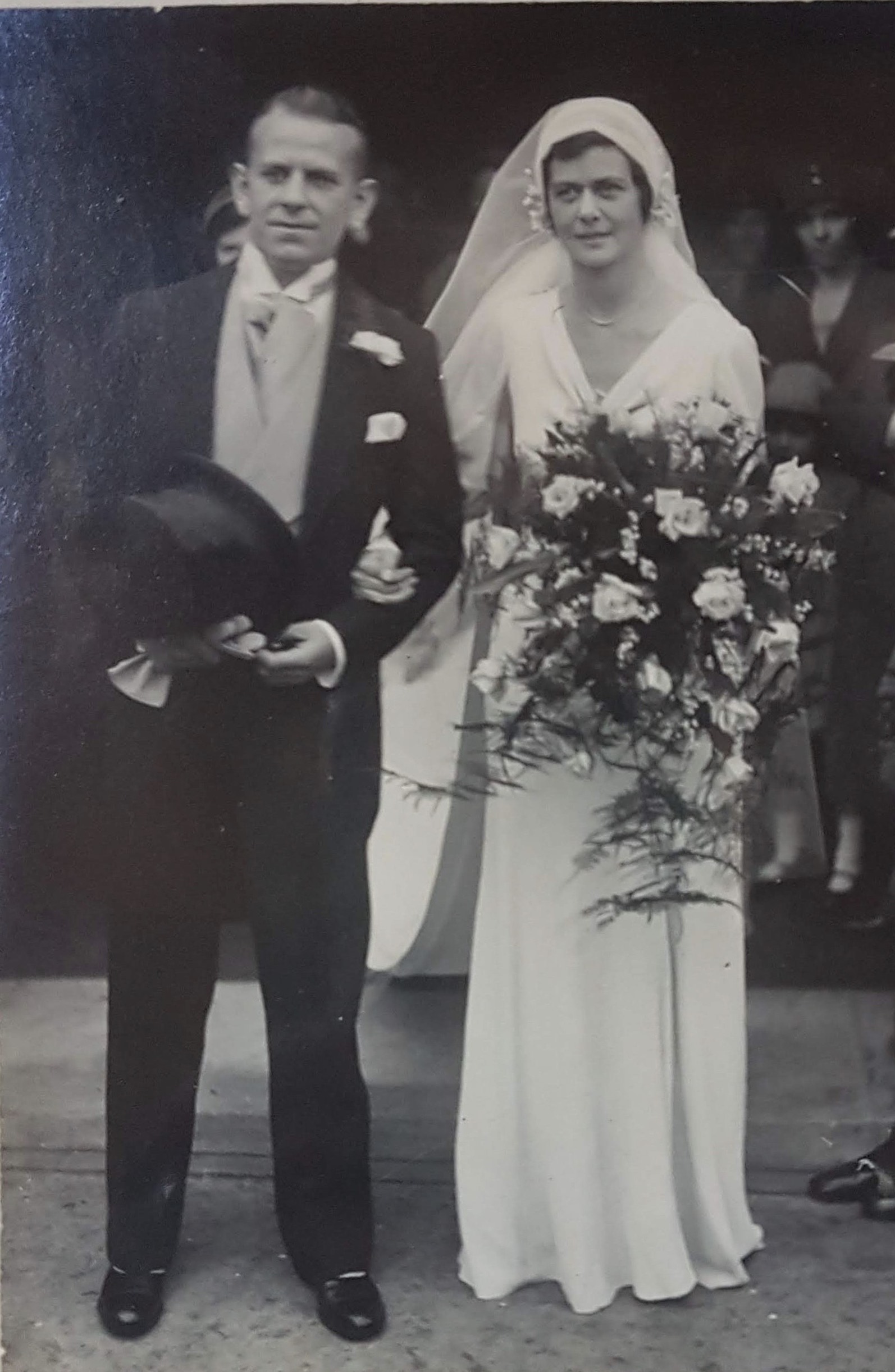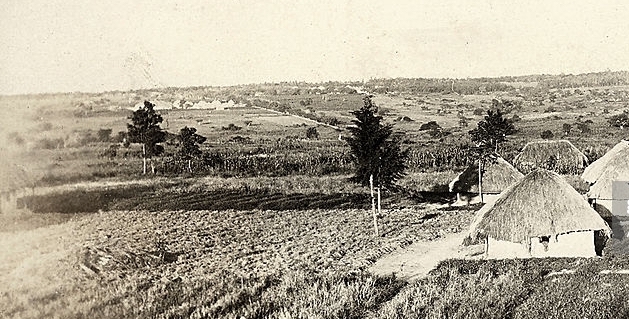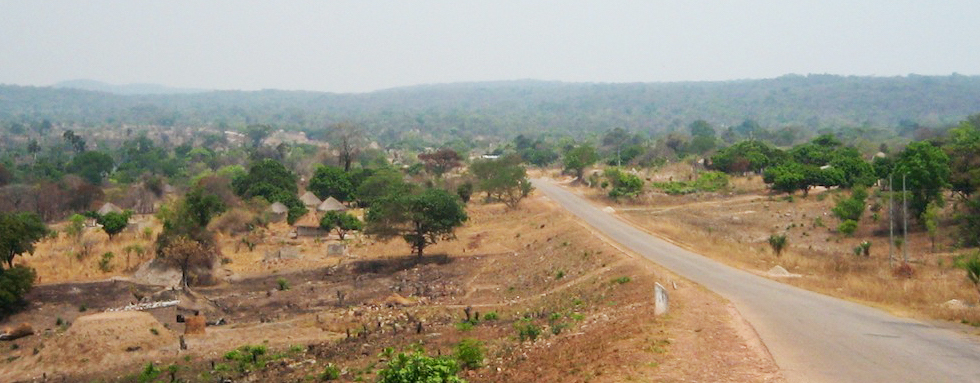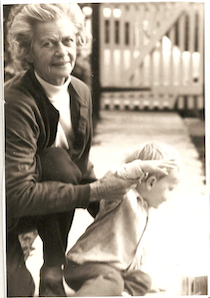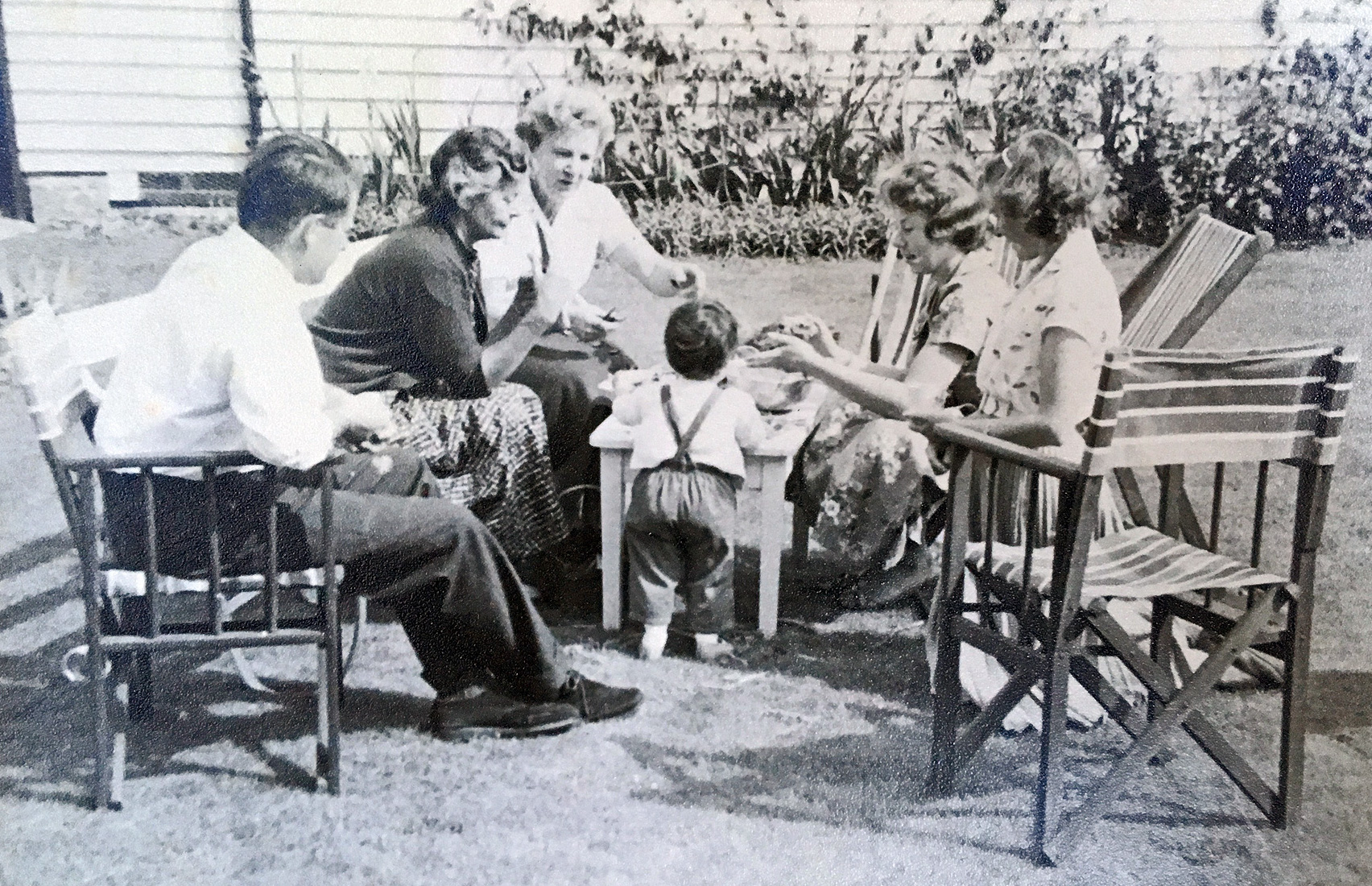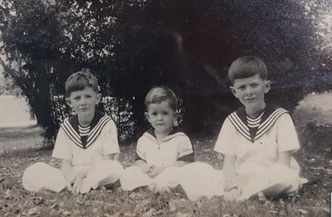Eric Frank Martin was born in 1903 in Kettering (Northamptonshire),
some 150 km north of London,
with official name Errick.
His father Walter was manager with a branch of Phipps,
shoe parts supplier in Kettering.
Bessie was born in 1902 in Grantham, Lincolnshire.
Her father Percy was physician.
From History of Oundle schools P.685: "from 1884 on, for Sir William Laxton's Grammar School a boy had to be at least seven years old on entering and must leave at the end of the term in which he became fifteen: he paid an entrance fee of fee of £1 and four guineas a year for tuition." P.659: "The subjects to be taught in the School were to be English, History, Latin, French, Arithmetic, Geography, Agricultural Chemistry, Bookkeeping, Land Surveying, Drawing and Vocal Music. During WW.I., P.535: "The tuition fees had risen to £45 per annum, and the boarding fees to £75 per annum with, roughly, an additional £10 for extras."
Having very good grades, he continued for a final year at Oundle School (these two schools were merged in 2000). He was "head of schools and fives chanpion as well as captain of cricket and soccer. In that time he also suffered from TB".
With his good school results he went on to Oxford and Cambridge for
various subjects of Agriculture.
He then went on to Harper Adams College of Agriculture near
Edgemont, Shropshire,
where he won a scholarship for Colonial Office Agriculture.
Then followed study at the Imperial College of Agriculture Trinidad
(established at St. Augustine, Trinidad, in 1921).
All the while, he played in first teams of cricket and got top grades.
Eric then took an interview in London and chose to go to Uganda as
agricultural officer.
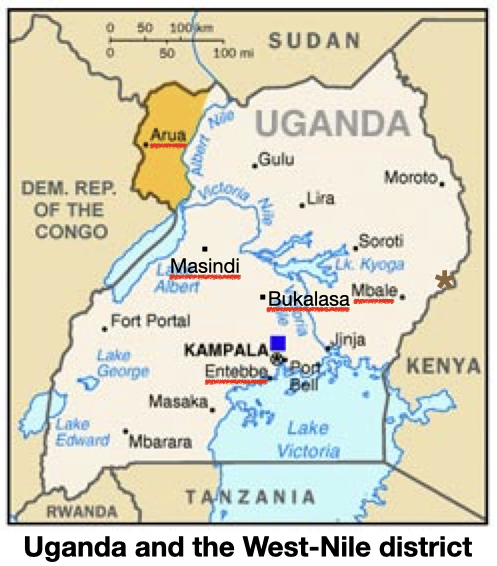
|
Eric was in Uganda as an Agricultural Officer in several places.
|
Then followed duties in the West Nile District,
at Arua.
While there he encountered, in 1932, Betty Phillips, a young english lady,
on holiday with her friend from school, Muriel Langton.
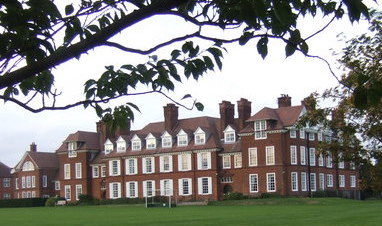
|
Bessie Phillips went to the then only girls
St Felix School, Suffolk
(photo from Wikipedia),
near the coast some 50 km to the SE of Norwich.
Her brother George died (see pilot) during WWI which made her the only child.
After the family had moved to London she qualified May 1924
with the "Chartered Society of Massage and Medical Gymnastics"
in medical gymnastics
(see exam certificate).
Bessie went on numerous long distance holidays with
her parents Percy and Ida.
|
|
Eric and Betty married in 1933 in Fulham Parish Church, London. So they went to Uganda together, Eric back to his job in the West Nile region, being based in Arua. The Arua area borders Sudan as well as the D.R.Congo and is a rather flat country.
From his base Eric walked through miles of country to explain to Chiefs the huge benefit of growing cotton.
Children, born in Uganda:
31/12/1934 twins Richard and George, in Arua;
02/07/1940 William Longmate (Bill), in Kampala.
They had a number of servants (from the local Hutu population)
who also engaged with the children.
After the birth of the twins Richard and George,
the respective grandparents came to visit and see the new citizens.
|
Soon they moved again, to Masindi, Eric now being Senior Agricultural Officer,
with oversight of the West Nile District and the Agriculture Officers there.
Toward the end of the 1930s they moved for a short time to Kampala
where William was born, in 1940.
But soon the family moved to
Entebbe,
then the seat of the government of Uganda. Here Eric worked as assistant Director under the Director of Ariculture, Geoff Clay.
Their house overlooked the Cricket field and Eric played for the local club as well as for Uganda.
They could also see the lake Victoria, and had many days fighting lake flies, and locusts.
In 1942 Richard and George went to school in Primary, getting there by train,
a night and a day. Betty came along once. Otherwise it was a train full of primary girls and boys.
In 1944 it was decided that the twins had to go to a smart Prep School
in Sussex, England.
Betty would bring them there, taking also young Bill along.
The travel started with a flight in a seaplane to Cairo, stopping a
dozen times on the Nile with a night in Khartoum.
A very horrid three weeks, Richard recalls.
He was getting there a gyppy tummy, being discovered by a British
Officer who had been patient of Grandpa's (George Phillips),
and getting rooms in the Officers Mess, on an island in the Nile, very swish.
A ship was eventually found that could take Betty and the boys to
Brittain, a Dutch troop ship, where George got appendicitis, and Mum
had to have a nervous break down to assure we stayed on board and NOT
be returned to Egypt.
The ship brought them in 3-4 days to Glasgow.
They had, however, no winter clothes so kindly Glaswegians found the
necessary very steerage garments for the boys, including baggy under pants,
and flannel shorts (they had always worn cotton khaki ones).
Now followed a horrific two days train journey to Sussex where Muriel
Langton met us and we stayed in her palatial house "Copyhold", in Partridge Green.
Once the twins were settled, Betty with Bill went back to Uganda.
During WW II Eric volunteered to go to Malta to help agriculture there, but his offer was declined due to his vital work in Uganda and his young family.
Eric, Betty and Bill came on leave to see the twins in the UK in the Summer of 1947.
After those years in Uganda, in 1948,
Eric became Director of Agriculture in Northern Rhodesia.
[ In 1924, after negotiations, the administration of Northern Rhodesia
transferred to the British Colonial Office,
|
|
August 1948
the twins started their journey from England back to Africa by ship.
Richard recalls: we had a young man, an athropologist,
as guardian on the steamer the "Warwick Castle",
but he did not interfere with our exciting games and new friends.
Cape Town was our destination. There we changed to a train to Mazabuka.
The train ride took three days
(out of boredom, we threw the hard train-pillows out of the window).
The train brought them, as Richard remembers,
to "heaven of heaven".
They were met by Mum and Dad on the sandy path near the train,
back in Africa again!
The children were now 13 (Richard and George) and 8 (William).
The following school year, the twins went to school by train to
South Africa,
to Natal,
also a three days train ride.
This school was at Michaelhouse.
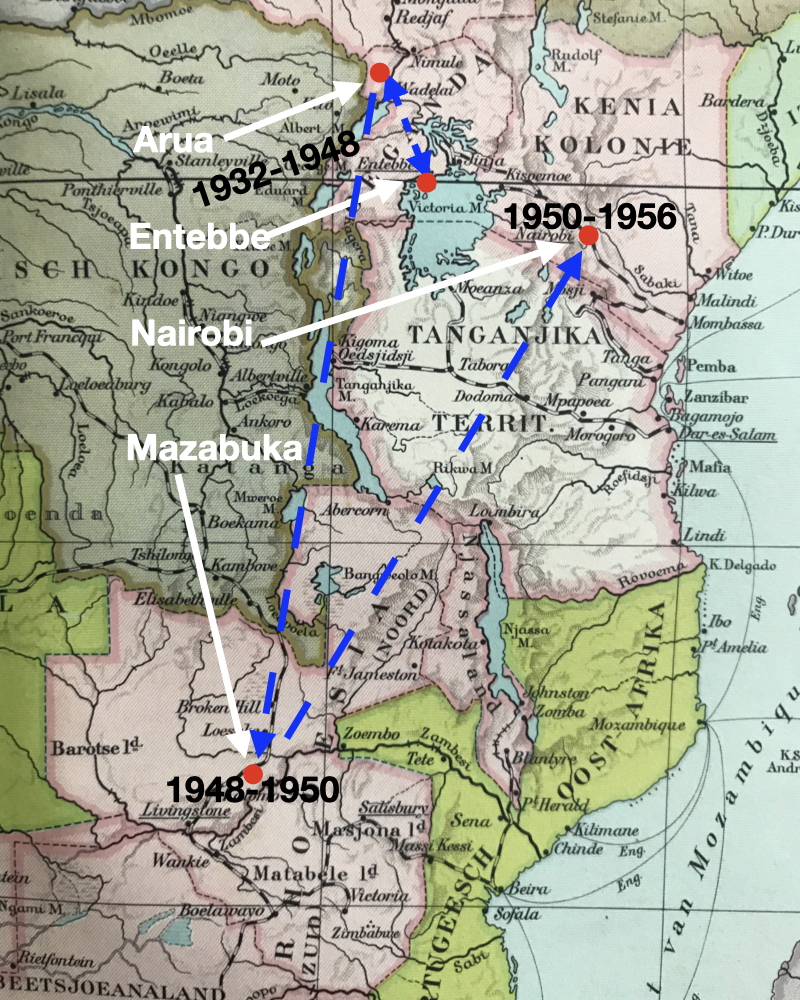
Stations of EFM in East Africa (background: 1933 map, in Dutch)
The job moves of Eric as of 1950 can be documented from the internet:
14/05/1950,
"Chief Executive Officer,
Board of Agriculture, Kenya";
see also the
offical announcement
in "The Official Gazette....".
1952-53,
"Home Guard duties during Mau Mau in Kenya"
(mentioned in "Documents in the British Isles" (1993);
registered documents from Eric Frank Martin).
1957, Eric Frank Martin, "CEO of Board of Agriculture"
to join the
East African Office in London.
1958, Eric Frank Martin to become, in London, immigration
officer
for Uganda.
05/03/1963, appointment as
Immigration Officer
is revoked; Governor of Kenya. He retired, at 60.
Kenya became an independent state in 1964.
So in 1950 they moved to Nairobi in Kenya.
"In Nairobi we lived near
Government House
and there saw Princess Elizabeth the very day she became Queen."
In 1956 Eric was transferred to the East Africa office in Londen.
The family then lived at Hassocks, near Richmond, Brighton.
|
Nepcote Lodge, Findon, West Sussex |
|
Eric retired 1963 to the Isle of Man, in the house "Breaside"
at Baldrine (near Laxey, east-side of the Isle),
a house he had bought from a friend in 1962.
In 1968 they sold this house and moved to Findon, West Sussex,
20 km WNW of Brighton, and bought the "Nepcote Lodge".
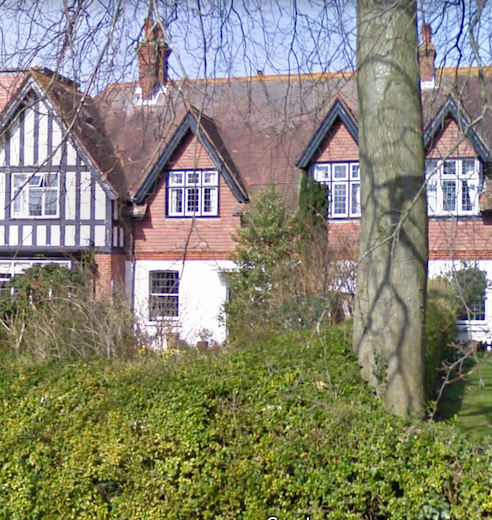
|
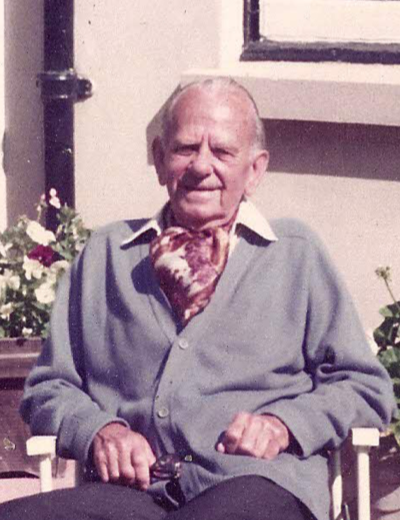
|
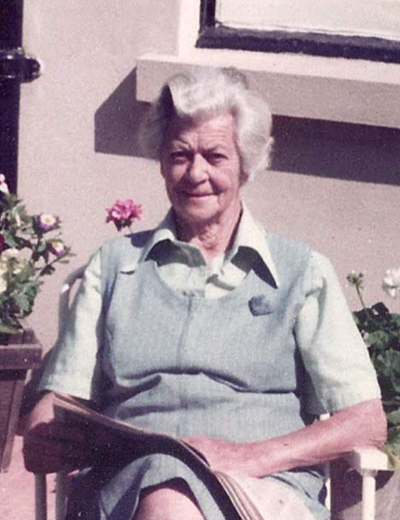
|
|
25 Steep Lane, Findon, West Sussex, where Eric and Betty lived their final years. Theirs was the middle section of the building. Their photos were taken in 1977. (Click: enlarge.) | ||
From the early 1970s they lived in 25 Steep Lane, Findon.
Grandson Gregory Eric Martin [GEM] remembers:
It is a lovely lane with holly hedges and the smell of people burning their grass clippings − fond memories.
Eric had a glashouse along the path leading to the house.
In 1977 photos were taken of Eric and Betty in the sun in front of their dwelling.
GEM: Then some time in early 80s they moved into a flat in
the heart of the village itself.
It was a great place, walking distance from the south downs way.
Diana Martin (daughter of George and his wife Rosemary) remembers:
We always referred to Grandpa as 'Grandpa Martin' and to Granny as 'Big Granny', because my Mum's Mum was much shorter than Betty. Grandpa Martin was austere, I was not fond of him but then he never really tried to get us girls to like him. But having said that he introduced my brother Tim to trout fishing (I think he related better to the grandsons, never having had daughters!). ..... I know that Greg also has a passion for trout fishing, I wonder if that was Grandpa's influence as well?
Grandpa did introduce me to the age-old hobby of stamp collecting. He had an extensive collection with the first stamp of Uganda - a tiny piece of paper with '10 Kowries' typed on it. .... He watched the Olympics and then was glued to the TV. Grandpa refused to buy a remote to change channels with - he said it was good exercise to get up and down to change the channels. He was grumpy and stubborn, I believe he refused to have the battery in his pacemaker changed!
|
|
I loved Big Granny to bits. We wrote letters often, all the way through my 'varsity' in Cape Town. I was her first grandchild, and even though my Mum was pregnant (only just) with me when my Dad and she got married (1958), a big no-no in those days, Betty was thrilled, and I still have a Pooh Bear mat she knotted for me. She was a great artist and she gave me and my Dad lessons on watercolour painting via the post with illustrations and comments on work he had done and sent her. I still have those lessons.
I remember her in Findon when we visited in the 1970's. We walked to the shops, she walked very fast (I do too) and she tripped on a paver; she travelled horizontal to the pavement for a couple of metres and all I could do was laugh. She did not fall, but once recovered we were in hysterics for ages and had to sit to catch our breath! That same holiday my Dad hired a barge to travel up the Thames. We would moor the boat on the river bank every evening and Granny, who was not allowed to smoke on the boat, would say to me: "Lets go for a walk". I was 16. Off we went across the fields to a pub where we would have a drink and she could have a cigarette!
Grandpa and Big Granny periodically came out to Zimbabwe to see us, the last time I saw Betty was just before she passed away. We went for a walk up at Inyanga (where our favourite holiday cottage was). It was too long a walk for her, and my sister Caroline and I had to make an arm stretcher for her to sit on to get her back to the car. I think I am very like Betty, I am an artist - it is my profession - and I was very sporty, she was too, played Lacross! And as a physio she was very good with sports injuries. My Mum had polio as a child in Uganda - she was 3 years old. My Mum's parents met my dad's parents as they were both working for the British government in the agricultural department. So when my Mum got polio Betty actually nursed her back to health with physio in a swimming pool. My Mum never had a withered leg thanks to Betty.
Eric died in 1993, in Findon. Betty died two years thereafter.
Notes on their sons:
William ("Bill") Longmate Martin: schooling in Sussex; became astronomer 1967 at
Radcliffe Observatory, Pretoria SA, then moved to the Cape Observatory;
he 1978 joined the Royal Greenwich Observatory,
first at Herstmonceux Castle, E.Sussex, later in Cambridge; died 15/01/1999,
see obituary.
George Martin: studied in Oxford, U.K., to become Reverend and worked most of his life in Zimbabwe. He stayed on in adverse situations there and was much respected. He died 13/09/2020, England. (This news spread quickly through the communities of religious former inhabitants of Zimbabwe, e.g. to Ashburton, New Zealand.)
Richard Martin: did his undergraduate studies at Rhodes Univ. in South Africa followed by graduate studies in Cambridge, U.K., to become Reverend and worked mostly in South Africa where he particularly enjoyed the enthusiasm, humble kindness, and joy of his Zulu congregations. He was much respected and appreciated by them. He later enjoyed, at Hillcrest, such intellectiual liberal parishioners as Alan Paton living at nearby Botha's Hill.
Basic data and memories are from notes by son Richard Martin, 2020.
The memories of EM himself (written in 1983) were essential.
The text has some additions from internet searches.
Gregory Eric Martin (GEM), son of Richard, contributed memories,
as did Diana Martin, daughter of George.
Family photos are from the archives of RM and of Antony Martin, son of Bill.
Back to the family tree page of Eric and Betty.

